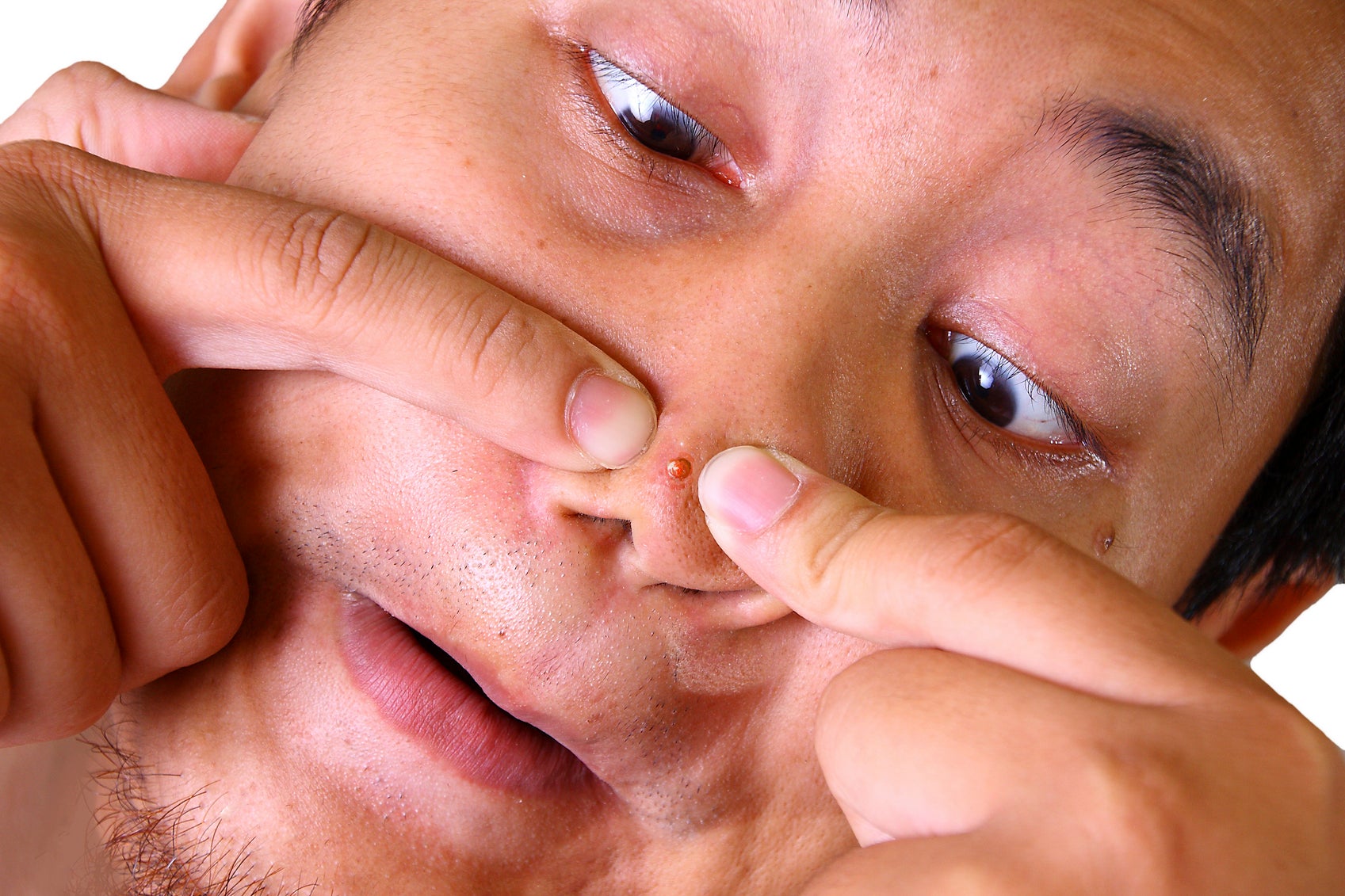Hayden Stanton is a seasoned pharmacist with extensive experience in working side by side with dermatologists. He specializes in writing about OTC and prescription acne treatments, leveraging his extensive knowledge and practical insights.
Why do pimples burst when you try to pop them? It's a question many of us have asked, and the answer lies in understanding what a pimple is and how it forms. A pimple is a small inflammation on the skin filled with pus, which is a combination of dead skin cells, bacteria, and sebum (oil).
Let's Uncover the Mystery: What's Inside a Pimple? 🧐
A pimple forms when the pores of your skin get clogged with sebum and dead skin cells. The bacteria Propionibacterium acnes (P. acnes), which naturally live on your skin, can then multiply within these clogged pores, leading to an infection and resulting in a swollen, red pimple filled with pus.
Ever Wondered Why Pimples Burst? Let's Dive In! 💥
When you squeeze or pop a pimple, you're applying pressure to this inflamed area. This can cause the pus-filled center to burst outwards, releasing the pus onto the surface of your skin. However, popping a pimple can also force some of the pus deeper into your skin, potentially leading to more inflammation and even scarring.

Think Twice Before Popping: The Hidden Dangers of Bursting Pimples 😱
Popping pimples can seem satisfying, especially when you see the pus being released. However, this can actually cause more harm than good. When a pimple is popped, the skin around the pimple can get damaged, which can lead to scarring. Additionally, popping a pimple can spread P. acnes bacteria on your skin, potentially leading to more pimples.
To better understand the risks associated with popping pimples, let's take a look at this informative video by Science Insider.
As you can see, popping pimples can lead to various skin issues, including scarring and further breakouts. Therefore, it's best to resist the urge to pop pimples and instead, seek appropriate acne treatments.
Resist the Pop: Your Guide to Safely Handling Pimples 🚫
So, what can you do if you have a pimple that you're tempted to pop? The best course of action is to resist the urge to squeeze it and instead treat it with over-the-counter acne treatments. These often contain ingredients like salicylic acid or benzoyl peroxide, which can help to reduce inflammation and kill P. acnes bacteria.
If you have a pimple that you're tempted to pop, the best course of action is to resist the urge and instead treat it with over-the-counter acne treatments. These often contain ingredients like salicylic acid or benzoyl peroxide, which can help to reduce inflammation and kill P. acnes bacteria. One highly relevant product for treating pimples is the
CeraVe Face Wash Acne Treatment. This cleanser contains 2% salicylic acid and purifying clay, making it effective in controlling and clearing breakouts. It is fragrance-free, paraben-free, and non-comedogenic, making it suitable for oily skin. By using this product, you can safely deal with pimples without the need to pop them.
Beyond the Surface: How Your Lifestyle and Diet Influence Acne 🥗
It's also important to note that your lifestyle and diet can play a role in acne. Certain foods, such as dairy and high-glycemic foods, have been linked to acne. Additionally, stress can also contribute to acne by increasing inflammation and oil production in the skin.
Foods That Can Cause Acne
To further understand the impact of diet on acne, let's take a look at some of the foods that have been linked to acne:
| Food Category | Examples | Possible Impact on Acne |
|---|---|---|
| Dairy Products | Milk, Cheese, Butter | May stimulate oil glands and cause acne |
| High-Glycemic Foods | White Bread, Pasta, Sugary Drinks | Can cause insulin levels to spike, which may lead to inflammation and acne |
| Fast Food | Burgers, Fries, Pizza | High in unhealthy fats and sugars, which can trigger oil production and cause acne |
| Chocolates | Milk Chocolate, Dark Chocolate | Some studies suggest chocolate may exacerbate acne, but more research is needed |
| Alcohol and Caffeine | Beer, Wine, Coffee, Tea | Can lead to dehydration, which may cause your skin to produce more oil and potentially lead to acne |
While these foods don't guarantee an acne breakout, they have been associated with acne in some people. It's important to note that everyone's body reacts differently to food, so what may cause acne in one person may not in another.
🔄 Switching Up Your Routine for Clearer Skin
If you're struggling with acne, making some lifestyle changes can help. This can include eating a balanced diet, managing stress, and maintaining a regular skin care routine. For more information on how to make these changes, check out our article on how to conquer breakouts.
One such lifestyle change is incorporating healthy meals into your diet. Here's an example of a meal that can help manage acne:
This hormone-balancing lunch is not only easy to prepare but also packed with ingredients that can stabilize your blood sugar levels and reduce sugar cravings, which can contribute to acne.
Wrapping Up: Your Journey Towards Understanding and Managing Acne 🎁
In summary, pimples burst when you try to pop them because you're forcing the pus out from the inflamed area. However, popping pimples can lead to scarring and further breakouts, so it's best to treat them with over-the-counter acne treatments and make lifestyle changes to help prevent acne.
Understanding and Dealing with Pimples
Test your knowledge about the causes of pimples and how to deal with them safely.
Learn more about 🧪 Understanding and Dealing with Pimples - Take Our Quiz Now! 🧪 or discover other Pimplely quizzes.




































